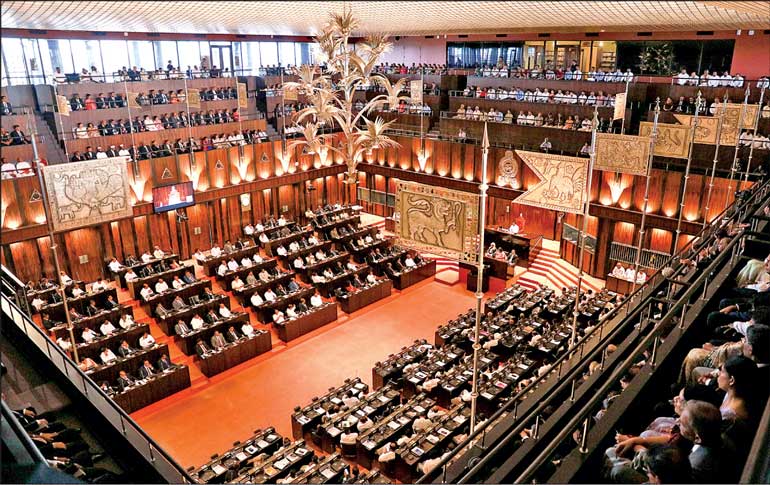Friday Feb 20, 2026
Friday Feb 20, 2026
Saturday, 31 May 2025 00:02 - - {{hitsCtrl.values.hits}}

Business as usual will not produce a system change
 Good ideas fail automatically. In a competitive environment and with limited resources, political parties need robust strategies to maximise their chances to win. In every day’s working routines, there is often a high focus on action and reaction – and little to no direction due to an unclear or non-existent strategy – Strategic Planning for Political Parties Abstract, Friedrich Naumann Foundation (https://www.freiheit.org/sites/default/files/2022-05/11_abstract_strategic-planning-2022.pdf)
Good ideas fail automatically. In a competitive environment and with limited resources, political parties need robust strategies to maximise their chances to win. In every day’s working routines, there is often a high focus on action and reaction – and little to no direction due to an unclear or non-existent strategy – Strategic Planning for Political Parties Abstract, Friedrich Naumann Foundation (https://www.freiheit.org/sites/default/files/2022-05/11_abstract_strategic-planning-2022.pdf)
As the Friedrich Naumann Foundation says “strategic planning is a key competence for political parties and their leadership personnel while in government or in Opposition. Strategy development cannot be delegated or outsourced. Nor can single strategy elements be copied from other successful political players. Own competences in strategic planning are needed, and political leaders will have to come up with the processes, tools and concepts to develop their own unique strategies. When in government, political parties are often forced to focus on short-term crises to the disadvantage of the medium- and long-term development of their strategies. However, good governance will not sacrifice long term objectives for short term gain”.
The absence of strategic plans contributes to this situation as specific medium to longer term plans lose their focus within the government and within the public domain. It is felt by many that the current Government in Sri Lanka could do with more clear and precise strategy development and incorporating them in strategic plans, as what appears to be happening are ad hoc activities directed towards short-term crises.
Elections are hopefully over for the rest of 2025. The six-month-old NPP Government can and should now present a comprehensive strategic plan for the rest of their term and give the public a clear pathway as to what they will strive to achieve in the next five years. Ideally, it should be based on their political vision contained in the election manifesto presented for the Presidential election and any subsequently identified priorities. Such a plan would help to avoid feeding a gathering public momentum about unkept promises and help the Government to work and deliver according to its own strategic plan. It needs to be noted that presenting a well-crafted and delivered long-term vision in a speech alone is insufficient and such a vision has to be reflected in a strategic plan.
What is strategic planning?
Today, Governments, including the current Government, face numerous challenges in decision-making processes and some of the common challenges include the difficulties faced regarding transparency and openness of governments to accept and appreciate the plurality of voices of the people.
Besides political reasons, the required expertise and the openness to listen to other views unfortunately has become a contributory stumbling block to the much talked about system change. The second challenge relates to the lack of institutional strength, meaning expertise required for decision-making. While the political establishment is responsible for policy development, at least on paper, the bureaucracy has the responsibility to implement policy decisions. If both institutions do not have the expertise and the capacity to carry out their responsibilities, the result naturally would be a focus on short-term measures where improvised and reactive actions based on various political imperatives are taken for short-term gain. It is perhaps time that the Government developed their own strategic plan and a guideline on methodologies needed for strategic action plan development at different levels and to be more inclusive in decision-making so that they strengthen and display their effectiveness and efficiency to all citizens.
As the National Democratic Institute (https://www.ndi.org/about) says, “In the broadest sense, planning means intentionally tracing a path from the present to the future to reach a goal. Planning implies defining options for the future and identifying the necessary means to achieve them and strategic planning has the exact nature of “planning.” However, its “strategic” nature involves an increased demand in terms of analytical work to view different options and allocate sufficient means so that the achievement of said scenarios is as optimal and rational as possible. In practice, strategic planning is defined as “a management tool for the decision-making of organisations based on their current activity and the path they must follow in the future to adapt to the environment changes and demands and achieve the best efficiency, effectiveness, and quality of all goods and services provided”. (https://www.ndi.org/sites/default/files/ Strategic%20Planning%20in% 20Political%20Parties% 20%28c%29%20%286%29%20%281%29.pdf)
Strategic plans are comprehensive documents that outline key long-term goals, key priorities, and the specific actions needed to achieve them, by entities including governments. They act as a roadmap, guiding an entity toward its desired future state and ensuring its resources are effectively allocated. The current Government, which has continuously stated their intention to affect a “system” change, could make a start by developing and introducing strategic plans for the Government itself and its ministries and making them available for online viewing by the public. The progress being made could then be tracked by the public and this would better facilitate accountability to the people.
Through such an effort, it is possible that the short-term mindset that seems to be the factor that influences governance, will change, and planning, incorporating both short-, medium- and long-term measures and working towards a long-term goal with specific deliverables will become the norm rather than the exception. A SWOT analysis, an analysis of the Governments or the relevant entity’s strengths, weaknesses, opportunities, and threats is critical in order to develop a strategic plan as planning should happen based on the status quo identified through a SWOT analysis.
Key elements of a strategic plan include:
Existing strategic plans
Some Sri Lankan Government agencies do have strategic plans, but most appear to have reached their end dates and not current any longer. A few plans that are up to date and well-constructed are the Digital Sri Lanka 2030 National Digital Economy Strategy 2030 Ministry of Technology, and the Sri Lanka Customs Strategic Plan 2024-2028. The Strategic Plan 2018-2022 of the Urban Development Authority of Sri Lanka has been well constructed but needs updating now.
The Department of Agriculture does have a Strategic Plan for 2022-2030, but it appears incomplete. Sri Lanka Export Development Board (EDB) has a strategic plan, and it is currently developing a five-year strategic plan for 2023-2027, aiming to increase Sri Lanka’s exports to $ 31.3 billion by 2027. The Sri Lanka Tourism Development Authority (SLTDA) strategic plan is due to end in 2025 and unless steps have already been taken to develop a fresh plan, one of the most critical economic pillars of the country and the Government, will function without appropriate strategies to achieve the stated goal of having five million tourists by 2029.
Besides tourism, the country needs to increase exports, reduce imports of food items and industrial goods through an import substitution strategy, and consider other out of the box thinking like health tourism, tourism linked to golf, and more information technology industry expansion. All these are medium to long term projects, and they need to be in the relevant ministry’s strategic plans.
While many of the existing strategic plans appear to have been developed prior to the formation of the current Government, it does not indicate that there had been a consistent and compulsory requirement for ministries and key entities within ministries to undertake such planning and develop strategic plans at least of five-year duration.
One of the key strategies that could be included in the Government’s own strategic plan is for each ministry to develop their own plans say within a period of three months from now, as six months have already passed since the Government was formed. Another strategy would be for all existing but dated and incomplete plans to be updated and completed and fresh plans developed for the period 2025-2030 again within a period of three months.
Governance utilising strategic plans is a professional and accountable process and it will assist in changing the political culture of the country through a mindset change amongst all stakeholders including the public. Consequently, political promises made from political platforms will be made more carefully and in a more responsible manner. The country is still financially very unstable and enjoying a honeymoon period till 2028 when debt repayments commence. It has a relatively short period of three years to earn more and/or spend less if it’s to meet its debt repayments. Specific strategies to achieve this objective are needed although strategies alone do not amount to much unless they are included in strategic action plans with measurable outcomes.
Changing the management culture and management methodology is an important element of system change. Business as usual will not produce a system change. Besides the Government, even other political parties will have to fall in line with more planned alternate governance models as the Government’s methods begin to show results and acceptance of them by the public.
The quotation attributed to Albert Einstein, viz, “Insanity is doing the same thing over and over and expecting different results” may also be presented as “repeating unsuccessful strategies without modification is a form of unproductive behaviour”. The quote highlights the importance of adapting and trying new approaches when the current ones have not yielded the desired outcomes.
Sri Lanka’s bankruptcy is an indication that it had been repeating unsuccessful strategies without suitable modifications. Unless the country recognises the need for true system change and modifies its governance methodology, it’s bound to continue its insanity.